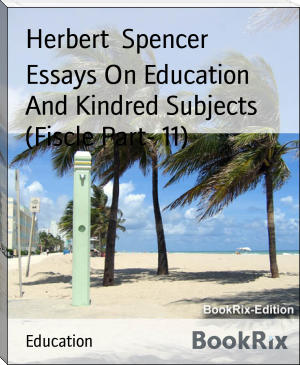Essays On Education And Kindred Subjects (Fiscle Part- 11), Herbert Spencer [historical books to read .txt] 📗

- Author: Herbert Spencer
Book online «Essays On Education And Kindred Subjects (Fiscle Part- 11), Herbert Spencer [historical books to read .txt] 📗». Author Herbert Spencer
The More Frequent Changes Of Pitch Which Ordinarily Result From Passion
Are Imitated And Developed In Song; And Here We Have To Add, That The
Various Rates Of Such Changes, Appropriate To The Different Styles Of
Music, Are Further Traits Having The Same Derivation. The Slowest
Movements, _Largo_ And _Adagio_, Are Used Where Such Depressing Emotions
As Grief, Or Such Unexciting Emotions As Reverence, Are To Be Portrayed;
While The More Rapid Movements, _Andante_, _Allegro_, _Presto_,
Represent Successively Increasing Degrees Of Mental Vivacity; And Do
This Because They Imply That Muscular Activity Which Flows From This
Mental Vivacity. Even The _Rhythm_, Which Forms A Remaining Distinction
Between Song And Speech, May Not Improbably Have A Kindred Cause. Why
The Actions Excited By Strong Feeling Should Tend To Become Rhythmical
Is Not Very Obvious; But That They Do So There Are Divers Evidences.
There Is The Swaying Of The Body To And Fro Under Pain Or Grief, Of The
Leg Under Impatience Or Agitation. Dancing, Too, Is A Rhythmical Action
Natural To Elevated Emotion. That Under Excitement Speech Acquires A
Certain Rhythm, We May Occasionally Perceive In The Highest Efforts Of
An Orator. In Poetry, Which Is A Form Of Speech Used For The Better
Expression Of Emotional Ideas, We Have This Rhythmical Tendency
Developed. And When We Bear In Mind That Dancing, Poetry, And Music Are
Connate--Are Originally Constituent Parts Of The Same Thing, It Becomes
Clear That The Measured Movement Common To Them All Implies A Rhythmical
Action Of The Whole System, The Vocal Apparatus Included; And That So
The Rhythm Of Music Is A More Subtle And Complex Result Of This Relation
Between Mental And Muscular Excitement.
But It Is Time To End This Analysis, Which Possibly We Have Already
Carried Too Far. It Is Not To Be Supposed That The More Special
Peculiarities Of Musical Expression Are To Be Definitely Explained.
Though Probably They May All In Some Way Conform To The Principle That
Has Been Worked Out, It Is Obviously Impracticable To Trace That
Principle In Its More Ramified Applications. Nor Is It Needful To Our
Argument That It Should Be So Traced. The Foregoing Facts Sufficiently
Prove That What We Regard As The Distinctive Traits Of Song, Are Simply
The Traits Of Emotional Speech Intensified And Systematised. In Respect
Of Its General Characteristics, We Think It Has Been Made Clear That
Vocal Music, And By Consequence All Music, Is An Idealisation Of The
Natural Language Of Passion.
As Far As It Goes, The Scanty Evidence Furnished By History Confirms
This Conclusion. Note First The Fact (Not Properly An Historical One,
But Fitly Grouped With Such) That The Dance-Chants Of Savage Tribes Are
Very Monotonous; And In Virtue Of Their Monotony Are Much More Nearly
Allied To Ordinary Speech Than Are The Songs Of Civilised Races. Joining
With This The Fact That There Are Still Extant Among Boatmen And Others
In The East, Ancient Chants Of A Like Monotonous Character, We May Infer
That Vocal Music Originally Diverged From Emotional Speech In A Gradual,
Unobtrusive Manner; And This Is The Inference To Which Our Argument
Points. Further Evidence To The Same Effect Is Supplied By Greek
History. The Early Poems Of The Greeks--Which, Be It Remembered, Were
Sacred Legends Embodied In That Rhythmical, Metaphorical Language Which
Strong Feeling Excites--Were Not Recited, But Chanted: The Tones And
The Cadences Were Made Musical By The Same Influences Which Made The
Speech Poetical.
By Those Who Have Investigated The Matter, This Chanting Is Believed To
Have Been Not What We Call Singing, But Nearly Allied To Our Recitative
(Far Simpler Indeed, If We May Judge From The Fact That The Early Greek
Lyre, Which Had But _Four_ Strings, Was Played In _Unison_ With The
Voice, Which Was Therefore Confined To Four Notes), And As Such, Much
Less Remote From Common Speech Than Our Own Singing Is. For Recitative,
Or Musical Recitation, Is In All Respects Intermediate Between Speech
And Song. Its Average Effects Are Not So _Loud_ As Those Of Song. Its
Tones Are Less Sonorous In _Timbre_ Than Those Of Song. Commonly It
Diverges To A Smaller Extent From The Middle Notes--Uses Notes Neither
So High Nor So Low In _Pitch_. The _Intervals_ Habitual To It Are
Neither So Wide Nor So Varied. Its _Rate Of Variation_ Is Not So Rapid.
And At The Same Time That Its Primary _Rhythm_ Is Less Decided, It Has
None Of That Secondary Rhythm Produced By Recurrence Of The Same Or
Parallel Musical Phrases, Which Is One Of The Marked Characteristics Of
Part 2 Chapter 5 (On The Origin And Function Of Music) Pg 130Song. Thus, Then, We May Not Only Infer, From The Evidence Furnished By
Existing Barbarous Tribes, That The Vocal Music Of Pre-Historic Times
Was Emotional Speech Very Slightly Exalted; But We See That The Earliest
Vocal Music Of Which We Have Any Account Differed Much Less From
Emotional Speech Than Does The Vocal Music Of Our Days.
That Recitative--Beyond Which, By The Way, The Chinese And Hindoos Seem
Never To Have Advanced--Grew Naturally Out Of The Modulations And
Cadences Of Strong Feeling, We Have Indeed Still Current Evidence. There
Are Even Now To Be Met With Occasions On Which Strong Feeling Vents
Itself In This Form. Whoever Has Been Present When A Meeting Of Quakers
Was Addressed By One Of Their Preachers (Whose Practice It Is To Speak
Only Under The Influence Of Religious Emotion), Must Have Been Struck By
The Quite Unusual Tones, Like Those Of A Subdued Chant, In Which The
Address Was Made. It Is Clear, Too, That The Intoning Used In Some
Churches Is Representative Of This Same Mental State; And Has Been
Adopted On Account Of The Instinctively Felt Congruity Between It And
The Contrition, Supplication, Or Reverence Verbally Expressed.
And If, As We Have Good Reason To Believe, Recitative Arose By Degrees
Out Of Emotional Speech, It Becomes Manifest That By A Continuance Of
The Same Process Song Has Arisen Out Of Recitative. Just As, From The
Orations And Legends Of Savages, Expressed In The Metaphorical,
Allegorical Style Natural To Them, There Sprung Epic Poetry, Out Of
Which Lyric Poetry Was Afterwards Developed; So, From The Exalted Tones
And Cadences In Which Such Orations And Legends Were Delivered, Came The
Chant Or Recitative Music, From Whence Lyrical Music Has Since Grown Up.
And There Has Not Only Thus Been A Simultaneous And Parallel Genesis,
But There Is Also A Parallelism Of Results. For Lyrical Poetry Differs
From Epic Poetry, Just As Lyrical Music Differs From Recitative: Each
Still Further Intensifies The Natural Language Of The Emotions. Lyrical
Poetry Is More Metaphorical, More Hyperbolic, More Elliptical, And Adds
The Rhythm Of Lines To The Rhythm Of Feet; Just As Lyrical Music Is
Louder, More Sonorous, More Extreme In Its Intervals, And Adds The
Rhythm Of Phrases To The Rhythm Of Bars. And The Known Fact That Out Of
Epic Poetry The Stronger Passions Developed Lyrical Poetry As Their
Appropriate Vehicle, Strengthens The Inference That They Similarly
Developed Lyrical Music Out Of Recitative.
Nor Indeed Are We Without Evidences Of The Transition. It Needs But To
Listen To An Opera To Hear The Leading Gradations. Between The
Comparatively Level Recitative Of Ordinary Dialogue, The More Varied
Recitative With Wider Intervals And Higher Tones Used In Exciting
Scenes, The Still More Musical Recitative Which Preludes An Air, And The
Air Itself, The Successive Steps Are But Small; And The Fact That Among
Airs Themselves Gradations Of Like Nature May Be Traced, Further
Confirms The Conclusion That The Highest Form Of Vocal Music Was Arrived
At By Degrees.
Moreover, We Have Some Clue To The Influences Which Have Induced This
Development; And May Roughly Conceive The Process Of It. As The Tones,
Intervals, And Cadences Of Strong Emotion Were The Elements Out Of Which
Song Was Elaborated, So We May Expect To Find That Still Stronger
Emotion Produced The Elaboration: And We Have Evidence Implying This.
Instances In Abundance May Be Cited, Showing That Musical Composers Are
Men Of Extremely Acute Sensibilities. The Life Of Mozart Depicts Him As
One Of Intensely Active Affections And Highly Impressionable
Temperament. Various Anecdotes Represent Beethoven As Very Susceptible
And Very Passionate. Mendelssohn Is Described By Those Who Knew Him To
Have Been Full Of Fine Feeling. And The Almost Incredible Sensitiveness
Of Chopin Has Been Illustrated In The Memoirs Of George Sand. An
Unusually Emotional Nature Being Thus The General Characteristic Of
Musical Composers, We Have In It Just The Agency Required For The
Development Of Recitative And Song. Intenser Feeling Producing Intenser
Manifestations, Any Cause Of Excitement Will Call Forth From Such A
Nature Tones And Changes Of Voice More Marked Than Those Called Forth
From An Ordinary Nature--Will Generate Just Those Exaggerations Which We
Have Found To Distinguish The Lower Vocal Music From Emotional Speech,
And The Higher Vocal Music From The Lower. Thus It Becomes Credible That
The Four-Toned Recitative Of The Early Greek Poets (Like All Poets,
Nearly Allied To Composers In The Comparative Intensity Of Their
Feelings), Was Really Nothing More Than The Slightly Exaggerated
Emotional Speech Natural To Them, Which Grew By Frequent Use Into An
Organised Form. And It Is Readily Conceivable That The Accumulated
Agency Of Subsequent Poet-Musicians, Inheriting And Adding To The
Products Of Those Who Went Before Them, Sufficed, In The Course Of The
Ten Centuries Which We Know It Took, To Develop This Four-Toned
Recitative Into A Vocal Music Having A Range Of Two Octaves.
Not Only May We So Understand How More Sonorous Tones, Greater Extremes
Of Pitch, And Wider Intervals, Were Gradually Introduced; But Also How
There Arose A Greater Variety And Complexity Of Musical Expression. For
This Same Passionate, Enthusiastic Temperament, Which Naturally Leads
The Musical Composer To Express The Feelings Possessed By Others As Well
As Himself, In Extremer Intervals And More Marked Cadences Than They
Would Use, Also Leads Him To Give Musical Utterance To Feelings Which
They Either Do Not Experience, Or Experience In But Slight Degrees. In
Virtue Of This General Susceptibility Which Distinguishes Him, He
Regards With Emotion, Events, Scenes, Conduct, Character, Which Produce
Upon Most Men No Appreciable Effect. The Emotions So Generated,
Compounded As They Are Of The Simpler Emotions, Are Not Expressible By
Intervals And Cadences Natural To These, But By Combinations Of Such
Intervals And Cadences: Whence Arise More Involved Musical Phrases,
Conveying More Complex, Subtle, And Unusual Feelings. And Thus We May In
Some Measure Understand How It Happens That Music Not Only So Strongly
Excites Our More Familiar Feelings, But Also Produces Feelings We Never
Had Before--Arouses Dormant Sentiments Of Which We Had Not Conceived The
Possibility And Do Not Know The Meaning; Or, As Richter Says--Tells Us
Of Things We Have Not Seen And Shall Not See.
Indirect Evidences Of Several Kinds Remain To Be Briefly Pointed Out.
One Of Them Is The Difficulty, Not To Say Impossibility, Of Otherwise
Accounting For The Expressiveness Of Music. Whence Comes It That
Special Combinations Of Notes Should Have Special Effects Upon Our
Emotions?--That One Should Give Us A Feeling Of Exhilaration, Another Of
Melancholy, Another Of Affection, Another Of Reverence? Is It That These
Special Combinations Have Intrinsic Meanings Apart From The Human
Part 2 Chapter 5 (On The Origin And Function Of Music) Pg 131Constitution?--That A Certain Number Of Aerial Waves Per Second,
Followed By A Certain Other Number, In The Nature Of Things Signify
Grief, While In The Reverse Order





Comments (0)